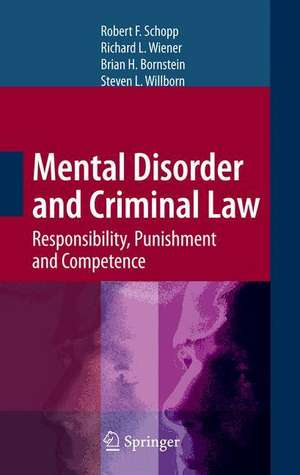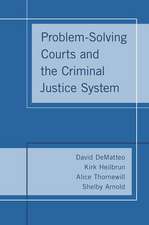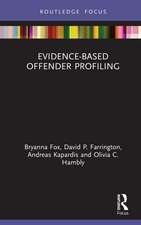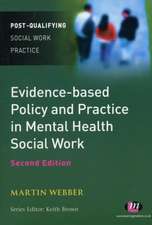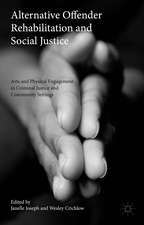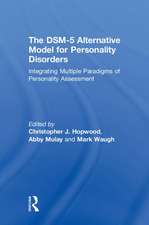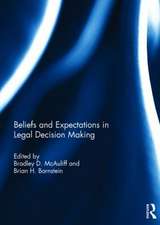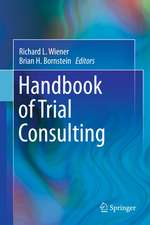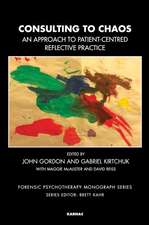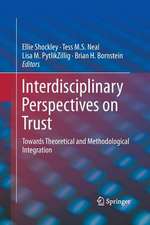Mental Disorder and Criminal Law: Responsibility, Punishment and Competence
Editat de Robert Schopp, Richard L. Wiener, Brian H. Bornstein, Steven L. Willbornen Limba Engleză Hardback – 21 noi 2008
| Toate formatele și edițiile | Preț | Express |
|---|---|---|
| Paperback (1) | 724.94 lei 43-57 zile | |
| Springer – 29 oct 2010 | 724.94 lei 43-57 zile | |
| Hardback (1) | 730.97 lei 43-57 zile | |
| Springer – 21 noi 2008 | 730.97 lei 43-57 zile |
Preț: 730.97 lei
Preț vechi: 891.43 lei
-18% Nou
Puncte Express: 1096
Preț estimativ în valută:
139.92€ • 152.03$ • 117.60£
139.92€ • 152.03$ • 117.60£
Carte tipărită la comandă
Livrare economică 21 aprilie-05 mai
Preluare comenzi: 021 569.72.76
Specificații
ISBN-13: 9780387848440
ISBN-10: 0387848444
Pagini: 248
Ilustrații: VIII, 248 p.
Dimensiuni: 155 x 235 x 16 mm
Greutate: 0.54 kg
Ediția:2009
Editura: Springer
Colecția Springer
Locul publicării:New York, NY, United States
ISBN-10: 0387848444
Pagini: 248
Ilustrații: VIII, 248 p.
Dimensiuni: 155 x 235 x 16 mm
Greutate: 0.54 kg
Ediția:2009
Editura: Springer
Colecția Springer
Locul publicării:New York, NY, United States
Public țintă
ResearchCuprins
Mental Disorder and the Criminal Process.- Depression and the Criminal Law: Integrating Doctrinal Empirical, and Justificatory Analysis.- Determining When Severe Mental Illness Should Disqualify a Defendant from Capital Punishment.- Accommodating Child Witnesses in the Criminal Justice System: Implications for Death Penalty Cases.- Protecting Well-Being While Pursuing Justice.- Judgments of Dangerousness and the Criminal Process.- Capital Punishment and Dangerousness.- Limited Expertise and Experts: Problems with the Continued Use of Future Dangerousness in Capital Sentencing.- Psychopathy, Culpability, and Commitment.- Quagmire Ahead!: The Sticky Role of Behavioral Science in Capital Sentencing.- Competence to Face Execution and the Roles of the Psychological Professions.- Meaningful Consideration of Competence to be Executed.- Psychological Expertise and Amicus Briefs in the Context of Competence to Face Execution.- Constitutional Health Care and Incompetency to Face Execution.
Notă biografică
Robert Schopp practiced clinical psychology before turning to the study of law and philosophy in an attempt to understand some perplexing issues that he encountered during ten years of clinical practice. So far, he remains perplexed, but he likes to think that he is perplexed in a deeper and more comprehensive manner. He joined the University of Nebraska -College of Law in 1989 after completing the concurrent law/philosophy program at the University of Arizona. His primary areas of interest involve questions that lie at the intersection of law, psychology and philosophy. These issues tend to arise in criminal law, mental health law, jurisprudence and professional ethics.
Richard Wiener received his Ph.D. from the University of Houston and his Masters Degree in Legal Studies at UNL. He was professor of Psychology at Saint Louis University (1982- 2000) and most recently chair of the Department of Psychology at Baruch College, City University of New York. In 2002 Dr. Wiener joined the Law-Psychology Program (as director) and the Social Psychology Program at UNL. He currently serves as the editor of Law and Human Behavior, the official journal of the American Psychology/Law Society (Division 41 of the APA). Dr. Wiener’s research applies theories of social cognition to problems in legal decision-making. Among the topic areas he has investigated are perceptions of sexual harassment, judgments of medical malpractice, and sociolegal jurisprudence. Currently Dr. Wiener applies dual process models developed in social psychology to explain juror performance in capital murder trials and to understand workers’ evaluations of sexual harassment claims. Other lines of research examine the way in which affirmative action laws influence perceptions of workforce quality, test the distinction between generic and specific prejudice in jury decision-making, test the role of implicit morality judgments in judges’ decisions in child neglectand abuse cases, and examine the role of emotion in judgments made by consumers who have filed bankruptcy. Dr. Wiener teaches courses at UNL on behavioral sciences and the law and legal decision making.
Brian Bornstein has been an Associate Professor at UNL since joining the psychology department in 2000. He is a member of the law/psychology and cognitive psychology programs, as well as Associate Director of the law/psychology program. He received his Ph.D. in psychology from the University of Pennsylvania in 1991,and a Master of Legal Studies from the University of Nebraska in 2001. Dr. Bornstein's research efforts focus primarily on how juries, especially in civil cases, make decisions, and the reliability of eyewitness memory. Additional areas of focus are in applying decision-making principles to everyday judgment tasks, as in medical decision making and distributive justice. He teaches courses on human memory, psychology and law, decision making, and history of psychology at the graduate and undergraduate levels.
Steven Willborn joined the faculty of University of Nebraska-Lincoln in 1979. He received his B.A. degree in 1974 from Northland College and his M.S. and J.D. (cum laude, Order of the Coif) degrees in 1976 from the University of Wisconsin. While in law school, he served as a member and editor of the Wisconsin Law Review. Professor Willborn was in private practice from 1976 to 1979. He has been a Fulbright Scholar at the Institute of Advanced Legal Studies, University of London (1985-86); a Visiting Scholar at the Australian National University in Canberra (1988), the University of Toronto (1991), and Lincoln College, Oxford University (1993); and a Visiting Professor at the University of Michigan Law School (1992). Professor Willborn has been licensed to practice law in Nebraska, Ohio and Wisconsin and to make cheese in Wisconsin. He teaches Employment Law, Labor Law, Legal Control of Discrimination, and Pension & Employee Benefits Law.
Richard Wiener received his Ph.D. from the University of Houston and his Masters Degree in Legal Studies at UNL. He was professor of Psychology at Saint Louis University (1982- 2000) and most recently chair of the Department of Psychology at Baruch College, City University of New York. In 2002 Dr. Wiener joined the Law-Psychology Program (as director) and the Social Psychology Program at UNL. He currently serves as the editor of Law and Human Behavior, the official journal of the American Psychology/Law Society (Division 41 of the APA). Dr. Wiener’s research applies theories of social cognition to problems in legal decision-making. Among the topic areas he has investigated are perceptions of sexual harassment, judgments of medical malpractice, and sociolegal jurisprudence. Currently Dr. Wiener applies dual process models developed in social psychology to explain juror performance in capital murder trials and to understand workers’ evaluations of sexual harassment claims. Other lines of research examine the way in which affirmative action laws influence perceptions of workforce quality, test the distinction between generic and specific prejudice in jury decision-making, test the role of implicit morality judgments in judges’ decisions in child neglectand abuse cases, and examine the role of emotion in judgments made by consumers who have filed bankruptcy. Dr. Wiener teaches courses at UNL on behavioral sciences and the law and legal decision making.
Brian Bornstein has been an Associate Professor at UNL since joining the psychology department in 2000. He is a member of the law/psychology and cognitive psychology programs, as well as Associate Director of the law/psychology program. He received his Ph.D. in psychology from the University of Pennsylvania in 1991,and a Master of Legal Studies from the University of Nebraska in 2001. Dr. Bornstein's research efforts focus primarily on how juries, especially in civil cases, make decisions, and the reliability of eyewitness memory. Additional areas of focus are in applying decision-making principles to everyday judgment tasks, as in medical decision making and distributive justice. He teaches courses on human memory, psychology and law, decision making, and history of psychology at the graduate and undergraduate levels.
Steven Willborn joined the faculty of University of Nebraska-Lincoln in 1979. He received his B.A. degree in 1974 from Northland College and his M.S. and J.D. (cum laude, Order of the Coif) degrees in 1976 from the University of Wisconsin. While in law school, he served as a member and editor of the Wisconsin Law Review. Professor Willborn was in private practice from 1976 to 1979. He has been a Fulbright Scholar at the Institute of Advanced Legal Studies, University of London (1985-86); a Visiting Scholar at the Australian National University in Canberra (1988), the University of Toronto (1991), and Lincoln College, Oxford University (1993); and a Visiting Professor at the University of Michigan Law School (1992). Professor Willborn has been licensed to practice law in Nebraska, Ohio and Wisconsin and to make cheese in Wisconsin. He teaches Employment Law, Labor Law, Legal Control of Discrimination, and Pension & Employee Benefits Law.
Textul de pe ultima copertă
The death penalty has long played a central role in jurisprudence, in terms of identifying the most serious offenses and the most culpable offenders, as well as understanding the mental conditions that may exclude an offender from such a sentence. More recently, the debate has intensified on competency to face [execution], the effects of psychological impairment on that competency, and the role of expert witnesses in establishing criminal culpability. The edited volume, Mental Disorder and Criminal Law authoritatively blends empirical findings and legal expertise with sophisticated reasoning and ethical analysis to promote a deeper understanding of these complex issues at the interface of legal and psychological domains. In short, it explores the concept of (as termed by one chapter author) "protecting well-being while pursuing justice."
Contributors to this important volume:
Contributors to this important volume:
- Examine the effects of depression at different stages of legal procedure.
- Offer proposed criteria for [prohibiting] capital punishment [of] the severely mentally ill
- Identify moral and procedural concerns in the use of child victims as witnesses.
- Analyze the balance between present responsibility and future risk.
- Untangle clinical and ethical issues for clinicians involved in capital sentencing.
- Clarify the process of psychological evaluation of competence to be executed.
- Review degrees of psychopathy in the context of criminal culpability.
Caracteristici
Expands traditional inquiry regarding the significance of psychopathology in the criminal process to include blameworthiness for sentencing, criminal competence at various stages in the process, and dangerousness Pairs legal analysis with empirical research in order to promote integration of these two aspects of relevant inquiry Addresses a wide range of participants in the legal, clinical, and academic disciplines Includes supplementary material: sn.pub/extras
